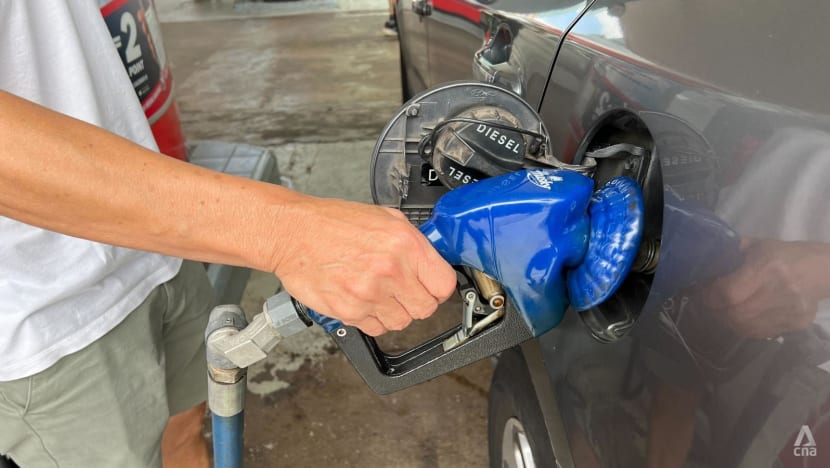Commentary: After removing diesel subsidies, Malaysia must now manage the fallout
Malaysia has commenced fuel subsidy rationalisation, but the government needs to do more to help those bearing the cost, says ISEAS-Yusof Ishak Institute’s Serina Rahman.

File photo of a person pumping diesel at a petrol station in Johor Bahru, Malaysia on Jun 23, 2024.
SINGAPORE: On Jun 10, Malaysia removed subsidies on diesel, a necessary measure to reduce the burgeoning diesel subsidy bill of RM14.3 billion (US$3 billion) in 2023 - compared with from RM1.4 billion in 2019 - and to stem leakages from diesel smuggling.
Prices in Peninsular Malaysia, where this change takes effect, increased by 56 per cent, from RM2.15 to RM3.35. This is still the third cheapest in Southeast Asia, after Brunei and East Malaysia, where the subsidy remains in place due to greater travel distances and higher costs.
Past governments have discussed fuel subsidy rationalisation - and faced political fallout when taking drastic action. In 2006, fuel price increases by then prime minister Abdullah Badawi, in tandem with steeply rising global prices and a mounting subsidy bill, triggered protests. The ensuing popular dissatisfaction contributed to the Barisan Nasional administration losing its two-thirds majority for the first time at the March 2008 general election.
Anwar Ibrahim’s Madani government is showing courage in phasing out fuel subsidies, starting with diesel. The timing of the move allows for potential public discontent to subside before the next general election due by early 2028.
While the government says that it saves RM4.5 million per day by the decision, it is still offering about S$2 billion (US$1.48 billion) in subsidies to the 33 listed categories of commercial vehicles eligible for subsidies, including school buses and ambulances, so as to prevent unnecessary price hikes.
CREEPING INFLATION
Eligible commercial diesel vehicle owners must obtain a fleet card to access subsidised diesel. Commercial diesel, which is used for industry and should be delivered directly to the business and not pumped at stations, is unsubsidised.
The government claims that it has plugged the leakage of subsidised diesel used by industry, as evidenced by the increase in commercial diesel sales by 4 million litres per day following the introduction of the new system. Concurrently, diesel sold at petrol stations fell by 8 million litres per day, or 30 per cent, compared to the week before.
The Madani government announced that savings from the price hike would be used to support poor families through various forms of social assistance, and that targeted subsidies would still be available to those who qualify under the Subsidised Diesel Control System. Low-income private diesel vehicle owners will pay the full price at the pump, but may apply for a monthly cash payout of RM200 to help defray the cost.
However, inflation appears to be creeping across the economy, despite efforts to mitigate the domino effects of the diesel subsidy removal.
Malaysians are already reeling from higher costs of living post-COVID, compounded by a weak ringgit which makes imported supplies and staples more expensive, and the increase in the sales and services tax from 6 per cent to 8 per cent this year.
Since the rationalisation, 10 companies have been hauled up for unfairly raising prices, as the government had issued prior warnings against unnecessary price increases. Among those charged was a school bus company that received the diesel subsidy.
SITUATION ON THE GROUND
The situation on the ground can be far removed from policy intention. This author’s check-in with roadside food stalls in Johor revealed that drinking-ice prices immediately increased by 50 cents.
Seafood markets in Gelang Patah on the outskirts of Johor Baru can no longer purchase flake-ice from Pontian, 40km away, as their supplier cannot afford to send it without an increase in the volume of purchases. This supplier is not currently eligible for the diesel subsidy. These seafood markets subsequently resorted to using regular drinking ice, which costs three times more.
The retention of diesel subsidies for commercial use has omitted various vehicle operators who now face cost crunches. Many small and micro-businesses use pick-up trucks, and a full tank now costs about RM180 - an increase of about RM60 which might be covered by the monthly cash assistance for the poor, if they are eligible. If not, the additional costs add to their already thinly stretched capital.
RoRo (roll-on-roll-off) truck drivers have already raised questions over their ineligibility for subsidies, which affects the viability of their rubbish collection services. Non-governmental organisations that provide food support to many poor communities, typically using diesel-powered trucks, are also saddled with higher fuel costs without the buffer of other social assistance.
While fishermen are eligible for diesel purchases at RM1.65 per litre, the benefit accrues to the owners of larger, often trawl, diesel-powered vessels. Most nearshore small-scale fishermen use petrol-powered outboard engines. The fear on the ground now is how they will cope with the impending petrol price hike, and the likelihood of wider-ranging inflation.
STRUGGLES OF THE AVERAGE CITIZEN
The current economic struggles are shared globally, and Malaysians will generally accept that subsidy rationalisation is necessary. Anwar deserves kudos for taking the highly unpopular step, yet it is the average citizen who pays the price.
His best hope is that the mitigating efforts will be more effective, and that most Malaysians will see that the fiscal strain on the government has accumulated from decades of systemic abuse and the follies of leaders’ past.
A recent IPSOS survey revealed that seven in 10 Malaysians feel that the country is in recession. Positive macro-level news, such as increases in international investment, trade surplus or GDP, do not necessarily translate into anything meaningful on the ground.
Those in the corridors of power do not feel the pinch like those who live by the day. More needs to be done to ensure that there is better scaffolding for those who struggle, even as drastic measures are necessary to bring Malaysia back to an even keel.
Serina Rahman is an Associate Fellow at ISEAS-Yusof Ishak Institute, and Lecturer at the Department of Southeast Asian Studies, National University of Singapore. This commentary first appeared in ISEAS-Yusof Ishak's blog, Fulcrum.


















